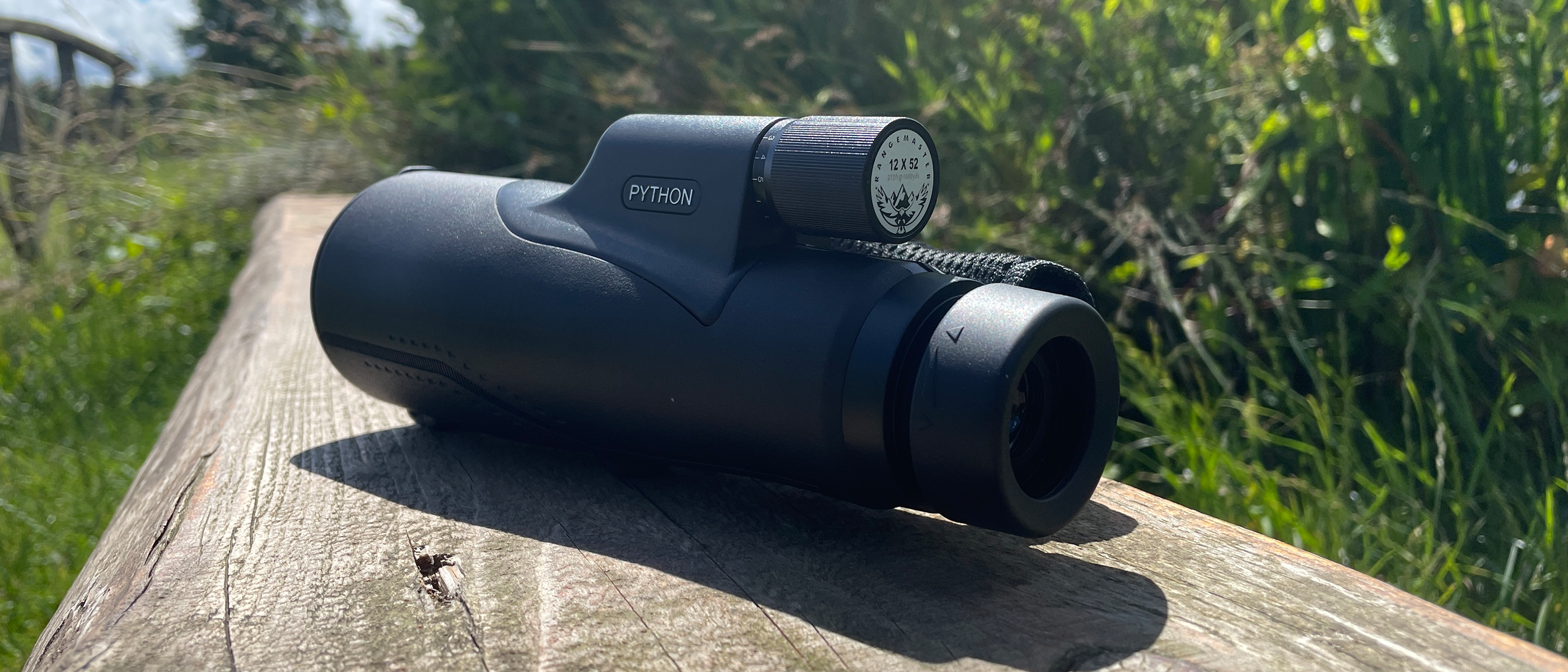Space Verdict
An impressive list of glass treatments, coatings and a higher-than-average magnification make it slightly larger and heavier than competitors but we think the quest for extra magnification and light transfer is worth it.
Pros
- +
Alpha-level German Schott glass
- +
Waterproof to IPX7
- +
Fully Broadband Multi-Coated Lenses
Cons
- -
Heavy at 579 g
- -
12x magnification requires using a tripod
- -
May be out of budget for some
Why you can trust Space.com
High-level glass treatments and a large 52mm objective lens mean the Python Rangemaster 12x52 monocular is a very impressive performer. The Rangemaster has a light transfer of 91%, which means excellent edge-to-edge sharpness and high-level color fidelity.
Although a hand strap is included, the 12x magnification needed an extra steady hand to avoid blurred images. We used the monocular without a tripod, but there was a call for one in certain situations.
The magnesium casing is coated with a rubber film, which we found to be lifting away from the chassis in some places. This may be a cause for concern in the long term.
The Python has an IPX7 waterproof rating and is nitrogen-purged, meaning it can work in extreme weather conditions.
Python Rangemaster 12x52 monocular review
Python Rangemaster 12x52: Design
★★★
- Magnesium chassis construction
- Hand strap fixes to the side of the unit
- Large 52mm objective lens
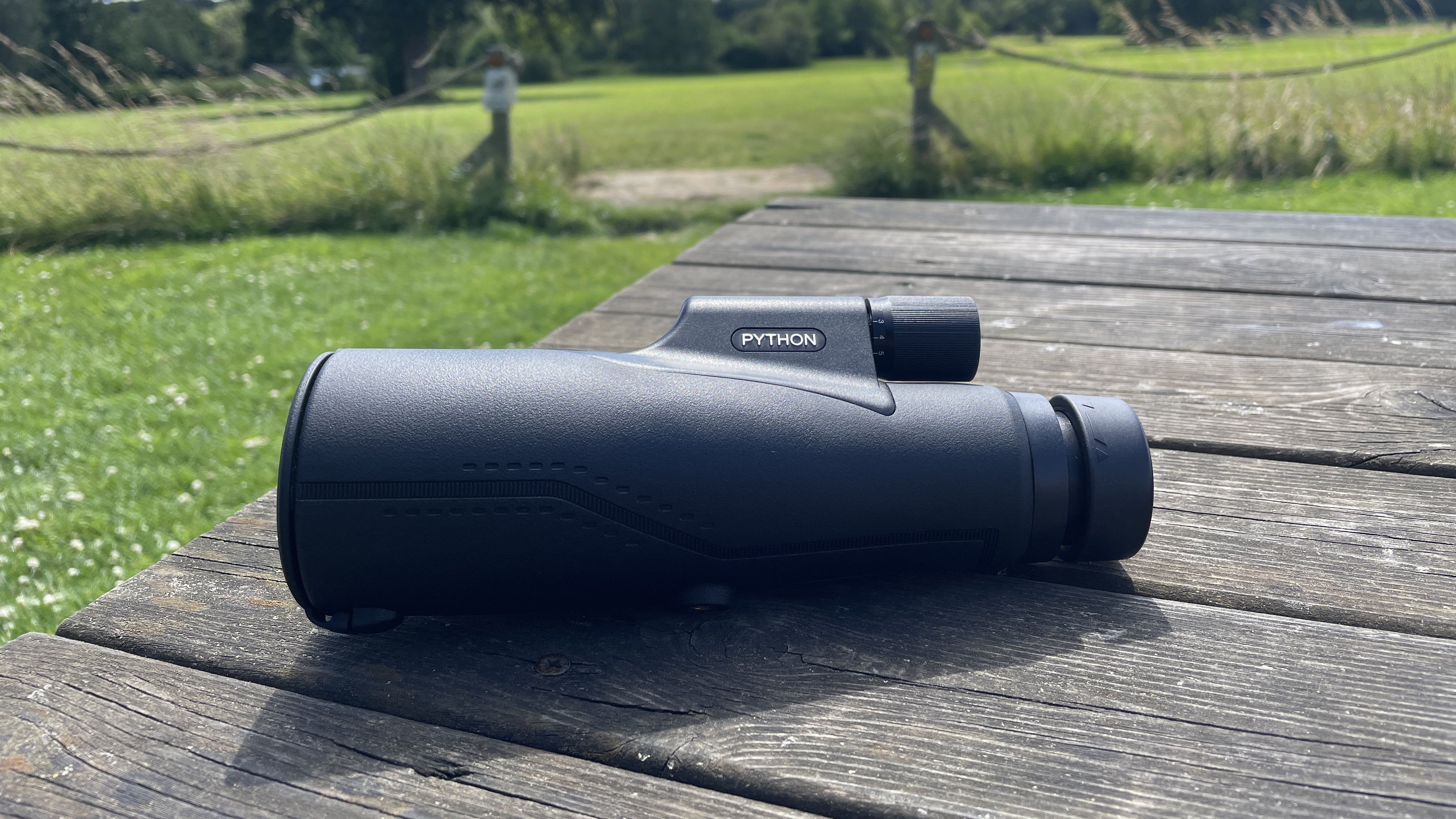
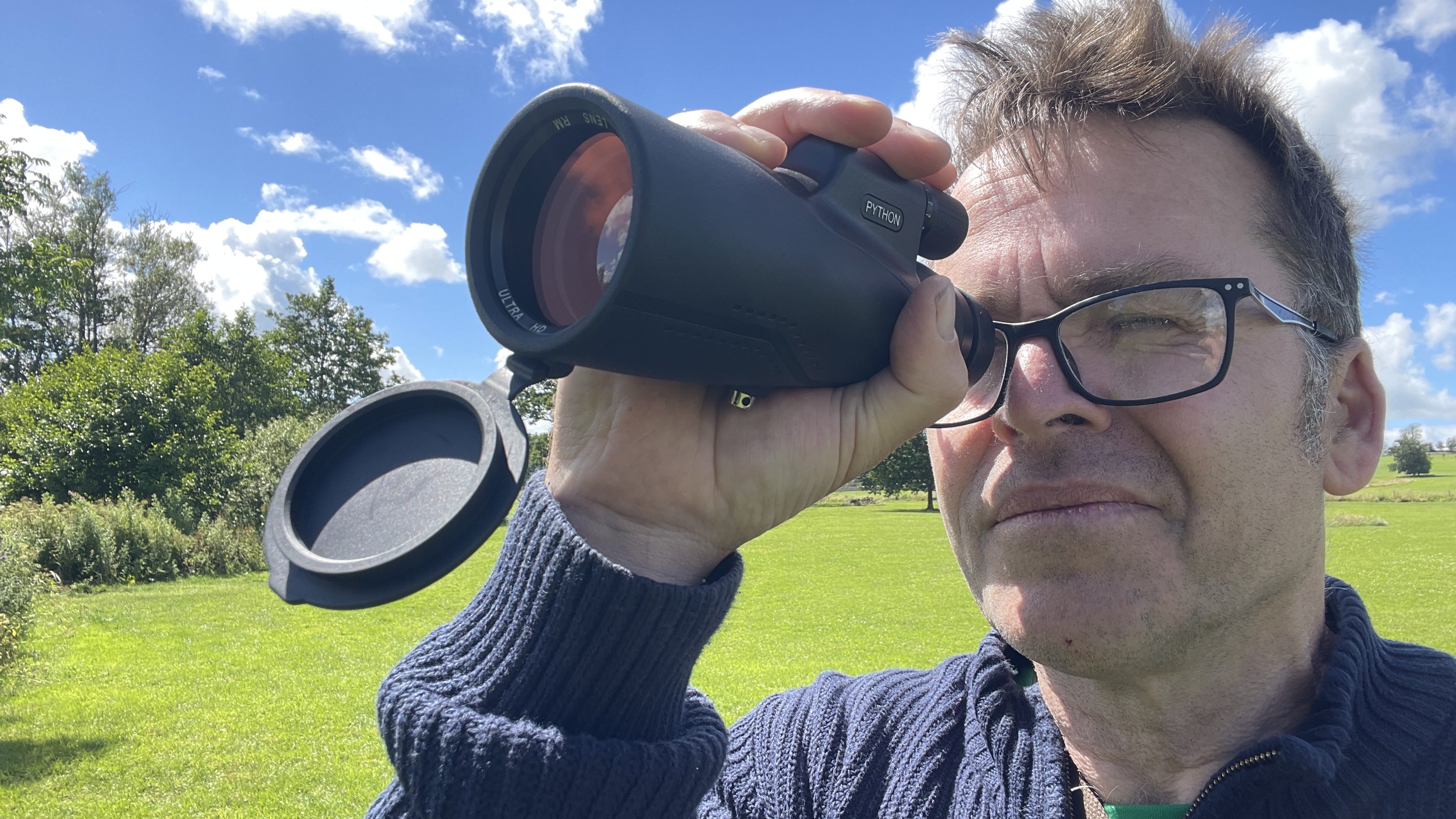
The Python Rangemaster 12x52 monocular has a Magnesium alloy chassis, which is much lighter and more durable than Aluminum. The Rangemaster is still on the heavy side of things at 576g. It's 20.5 cm long, making it more suited to those with larger hands. It has a rugged construction and feels well made, although the rubber casing on our unit was starting to separate slightly from the body, especially around where the eyepiece meets the collar. This didn't get worse on our test, but it was a cause for concern.
The strap that ships with the monocular was helpful as the unit is larger than many others we have tested and we found it unsuitable for transporting in a jacket pocket. We found ourselves walking on the test with the unit in one hand instead of in its bag. The strap does an excellent job of stabilizing the monocular, but we were glad to notice the inclusion of a tripod fitting.
The rubber eyecup has a three-position movement, enabling spectacle-wearing or naked-eye usage. There is a slide-on eyepiece cap, but we would prefer it to be tethered. The objective lens cap is hinged on the unit's body and falls out of the way once opened.
Breaking space news, the latest updates on rocket launches, skywatching events and more!
The top-mounted focus wheel has a smooth, well-engineered action and is pleasant and quick to use. We found one-handed use possible, but the unit's large size may be awkward for those with small hands.
With a 52mm objective lens, the unit looks more like a small telescope than a monocular. A 52mm lens means plenty of light is gathered, and the quality of the images proves this.

Design: Roof prism
Magnification: 12x
Objective lenses: 52mm
Eye relief: not specified
Weight: 20.4 oz / 579g
Dimensions: 8.1x3.5x2.6-inches / 205 x 890 x 660mm
Durability: Waterproof and fogproof
The Rangemaster uses glass from German manufacturer Schott. This company has been producing optical glass for well over one hundred years and has an excellent reputation for the quality of its products. The glass is from Schott's HT range, known for its superb light transmitting ability, giving the Rangemaster 71% light transfer.
The Rangemaster comes with a very shiny, cheap-looking shoulder bag. Although it functioned well on the test, it does not suit a premium product. It has a magnetic clip fastener, which was a nice touch, and it enabled you to place the monocular in the bag with one hand.
There is a universal mount for the monocular, which proved to be very awkward to use. The Rangemaster is a large unit, and the front-loaded weight made it difficult to get a clear image on the phone once attached. For a monocular of this size, a more individual design may be a better idea.
Python Rangemaster 12x52: Performance
★★★★
- Excellent light transfer
- Very sharp, clear image
- Fantastic low-light performance
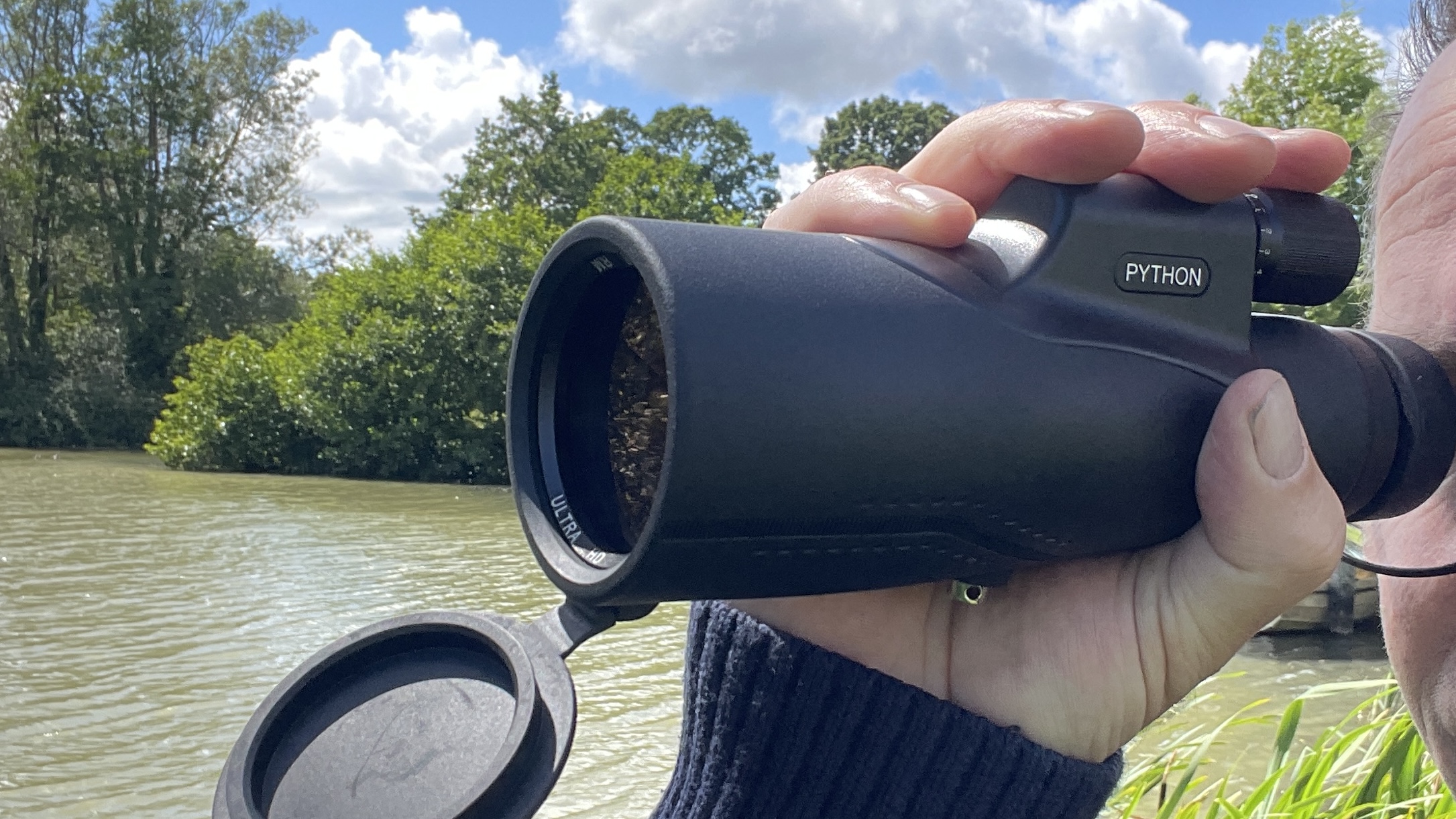
As soon as you take the first look through the Python Rangemaster, you can understand where Python has focused the budget. The image is very sharp across the whole view, and the colors are well portrayed. The unit's light transfer of 91% enables it to produce good mesopic vision with high contrast and good color fidelity. The lenses are fully multi-coated. This means that all of the glass surfaces have multiple coatings, not just some. This provides bright, sharp, high high-contrast images.
The roof-mounted prism glass also has a Dielectric coating which has a reflectance that exceeds 99%. By utilizing reflectivity across the full visible range, the color reproducibility is high. The prism has a phase correction coating which equalizes the two lenses, creating a much clearer image.
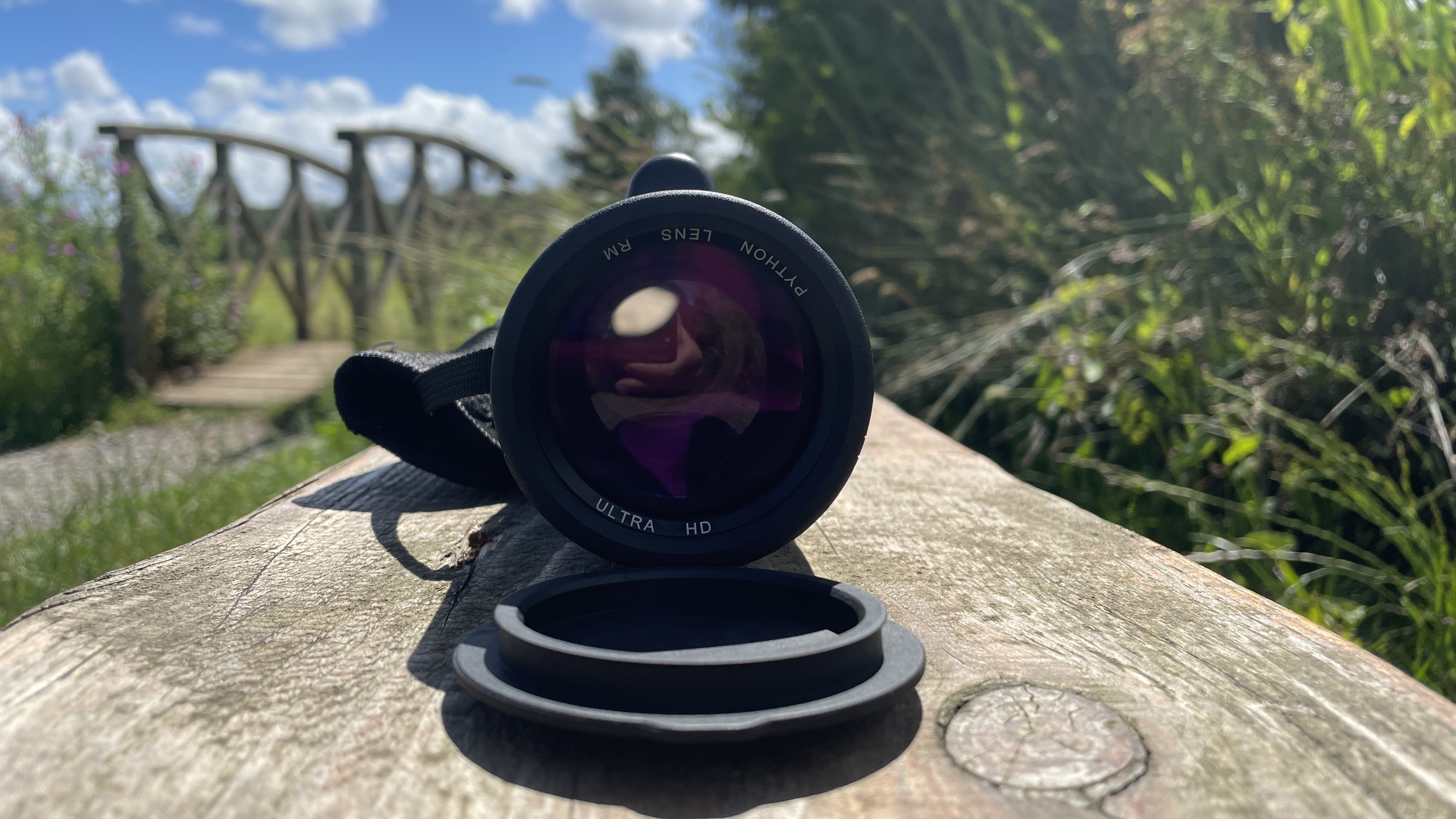
As we were using the Rangemaster during the day, the effect of this attention to detail became apparent. The colors of bird plumage were well rendered and true, with the high contrast levels making the identification of similar-colored birds much easier.
The objective lens has a diameter of 52mm, which enables plenty of light through the optic. This helps with low light levels. For example, we went to our local church, where we used the Rangemaster to look at the stained glass windows and the various statues up near the ceiling. It coped very well with the poor light in the church, and we were able to examine the subjects in close detail.
For Hide use, the Rangemaster was excellent. It really feels like a small telescope rather than a pocket-friendly monocular. The 12x magnification provided intimate detail of nesting geese, where we were able to delineate between juvenile and older birds with ease. The clarity of the images was also impressive at distances where less-quality optics would have struggled. We found that we did need to rest an elbow on a ledge or window, though, just to help stabilize the image.
It's this extra light transfer and up-rated 12x magnification that makes the Python Rangemaster such a good monocular for stargazing. As aforementioned, it's like a mini telescope and, provided you're stabilizing the monocular with a tripod or against a wall or tree, it's easy to pick out fainter night sky objects. The Hercules globular cluster (M13) was clearly visible with averted vision as was Andromeda (M31) despite mixed seeing conditions.
The phone adapter was very awkward to use, and although once set up, we did manage to get some images, the set-up time was so long that we wouldn't use the mount very often. The main flaw is that once attached, the optic is so nose-heavy that holding the optic and phone together was a very fiddly experience.
Python Rangemaster 12x52: Functionality
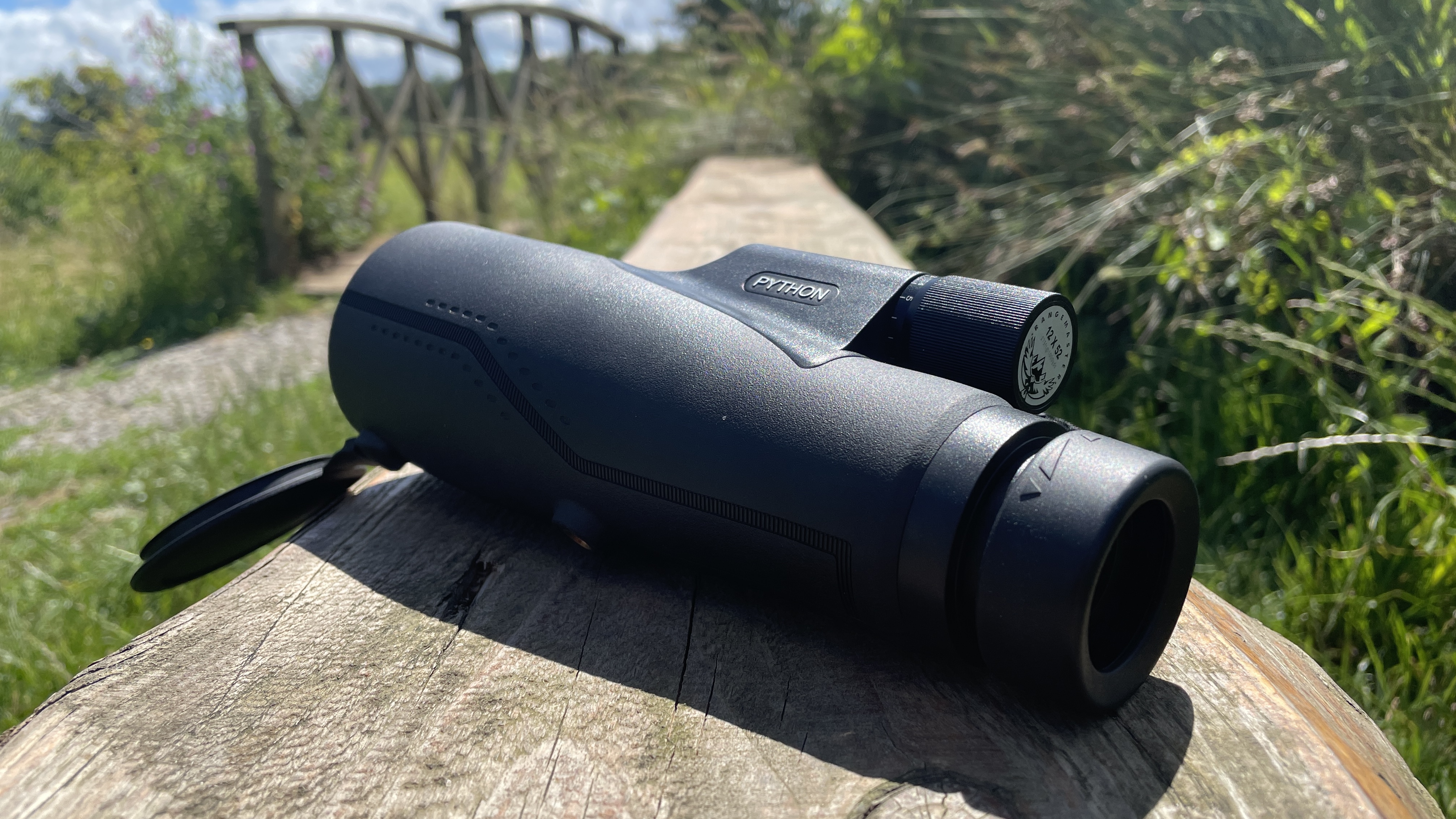
★★★★
- Well-weighted focus wheel
- Tough, well-made chassis
- Excellent imagery
The Rangemaster was very comfortable to use with its side-mounted hand strap and three-way adjustable eyepiece. Although the unit is quite heavy at 579 g and has a high 12x magnification rate for a monocular, the image quality was such that we were prepared to forgive a few shortcomings.
Tracking flying birds with the optic was made easy with the wide viewing angle of the 52mm objective lens and the fast and smooth action of the focus wheel.
The rubber armor on our test unit was like a sleeve, and unfortunately, we found it lifting around the edges of the optic, especially around the eyepiece end of the assembly. It looked like it could cause snagging problems while in use over time. This may have just been an issue with our test unit, but it's worth noting.
User reviews of the Python Rangemaster 12x52 monocular
Users on Amazon report an average of 4.3/5 stars over 26 ratings and there are no 1-star reviews. Many praise it as 'the best monocular on the market' and other users say that the Rangemaster isn't cheap, but the quality of the glass is very high. They also say that the monocular has excellent visual clarity, sharp images, and good low-light performance which tracks with our own experience during testing.
Should you buy the Python Rangemaster 12x52 monocular ?
✅ You want excellent clarity: The views you get here are fantastic for several reasons we've outlined in this review.
✅ You want something for use in all weather and temperatures: This monocular is waterproof, rated to IPX7 and fogproof.
❌ You want to use it to take photographs with a Smartphone: The mount is very awkward to use.
❌ You want something for long hand-held viewing sessions. The 12x magnification requires a tripod for comfortable observing for any significant length of time
During testing, we found the Python Rangemaster 12x52 monocular to be a high performer when it comes to optical clarity and sharpness. The attention to the glass coatings and the resulting pin-sharp imagery make us rate this unit very highly, and we would definitely recommend it.
It's clear that Python has concentrated their budget for this monocular on the optical characteristics, with the rubber armoring lifting around areas where it meets the optical assembly as already mentioned, but overall this is a decent trade-off considering its cost.
If the Python Rangemaster 12x52 monocular isn't for you
If this product isn't for you because of its high price, then the Bushnell Legend Ultra HD monocular is considerably less expensive but still provides good views. We gave it 4/5 stars because it has a rugged, waterproof construction, and we felt the price point was a good balance between quality and cost.
It's possible that the overall bulk of the Rangemaster is too much for you and you need something a little more compact. If so, then we would recommend the Opticron Explorer WA ED-R (which at date of publishing we are currently finishing our review of) with its decent image quality and small pocket-sized chassis. The Hawke Endurance ED 10x42 has excellent glass, including ED light-efficient coatings that match the Rangemasters' low-light capability, and it is currently performing favorably under our full review due to be released soon.

Matt Morris is a keen astronomer, wildlife watcher and photographer living in Somerset, UK. He started stargazing and birdwatching at the age of 10 with his father who took him to bird hides and nature reserves around England. This sparked his interest in cameras and optics, a passion that has now spanned the better part of four decades and led to his being featured in several national photography magazines for competition-winning photos.
